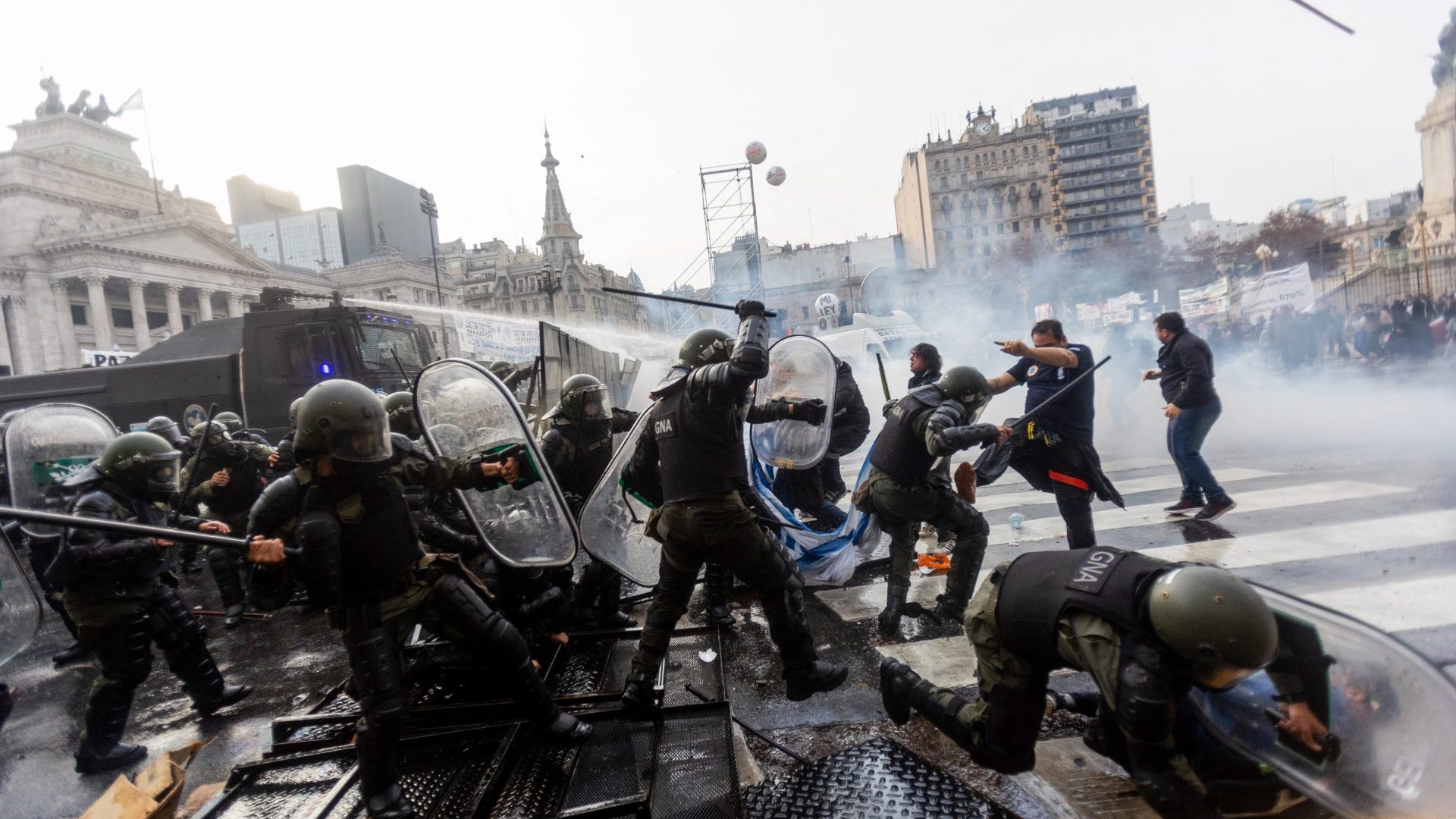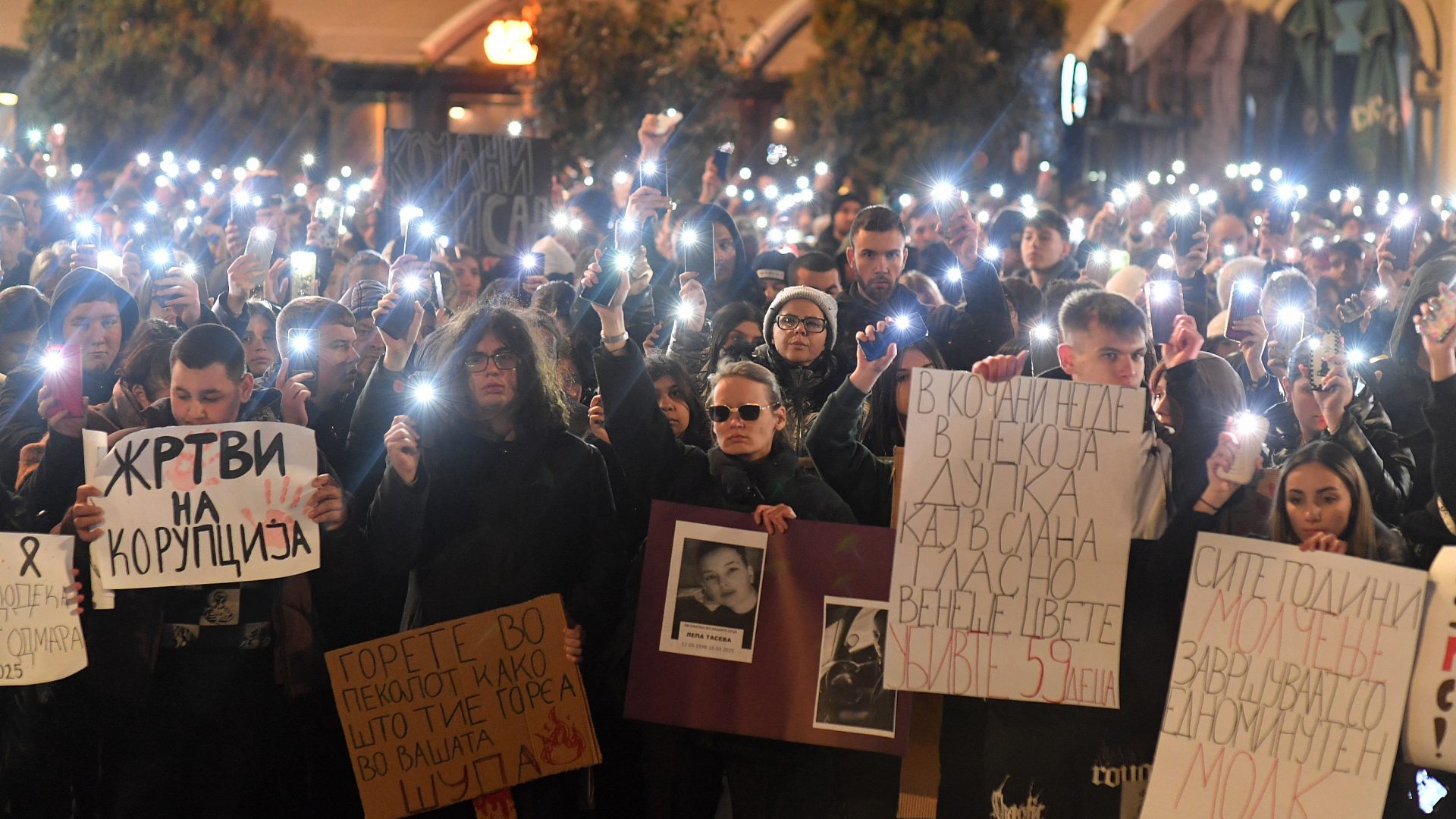The pensioners waved their walking sticks in the air; the police their guns. For months, Argentinian retirees have gathered on Wednesdays in front of congress to protest about the state of their pensions and the rising cost of medication. Both have been affected by Javier Milei’s budget-slashing austerity programme.
The pensioners have been supported by football clubs, universities and local rights groups, and as the number of protesters has swelled, the police have started cracking down.
I’ve seen a lot of marches in Argentina, where the soundtrack is a mix of drums, whistles and vendors loudly hawking beer from mobile coolers. While there is usually passion and sometimes anger, protests are often a jovial affair, with all manner of people showing up to demand better from their government.
But the police response to the pensioners’ march on March 12 was different – and shocking.
An hour before the demonstration officially started, I could hear the explosions of teargas canisters. The congress building, the proposed location of the protest, was blocked off and a wall of riot police were lined up against the steel fences, batons at the ready. An hour into the demonstration hundreds more officers arrived, riding motorbikes straight at the crowds and pointing their guns towards those running away.
More than 1,000 officers used teargas, rubber bullets and water cannons to disperse the demonstrators. At least 672 people were injured and 114 arrested, including a 12-year-old and a 14-year-old who were walking home from school.
A 35-year-old photographer, Pablo Grillo, was injured when a teargas canister fired by the police fractured his skull and led to a “loss of brain mass”. He remains in intensive care. An elderly woman was filmed being knocked down by police, cracking her head on the pavement as she fell, and an elderly man was also recorded being beaten by police.
Rodrigo Pomares, a human rights monitor working at the protest, said the “situation became violent because of the police, not the people”.
Angered rather than deterred, last week, on March 19, the elderly returned in their masses.
Alice Vila, 73, said she had come to show solidarity with her peers. “The repression is terrible, it feels like 1976-83 again,” she said, referring to Argentina’s brutal military dictatorship, which led to the forced disappearance of an estimated 30,000 people. “This police violence is undemocratic.”
Patricia Bustos, 66, said she was bracing for more violence. “Last week they repressed us, they hit an elderly woman like me,” she said. The retiree had written her calls for better pay on an A4 sheet of paper. “They have taken away our medication, and pensions are worth less and less every month. We can’t buy food, we can’t buy clothes.”
Pensioners were described as the biggest losers during president Milei’s first year in office. Around 60% of pensioners receive only the minimum amount, equivalent to around $360 a month, while the government has also stripped back the list of free medications.
The government has not extended a pensions moratorium, meaning that those who do not have 30 years of contributions will be prevented from accessing funds. Thousands of people will be affected.
Patricia stood hand in hand with her friend, Maddie Figueroa. Maddie is 65 and had planned to retire from her job as a carer next year.
“I won’t be able to retire. I have 20 years of contributions, but now I won’t be able to access the pension pot. It’s bad, really bad,” she told me. “I cried when I read the news. I am filled with anger.”
After the March 12 protest, the government doubled down on its messaging. The security minister, Patricia Bullrich, justified the police action and called the protesters “hooligans”. Others in Milei’s government called it an “attempted coup d’état”. A message on trains in the morning on March 19 read: “The police will repress all attacks against the Republic.”
But while there was a heavy police presence, fences blocking congress, and water cannon at the ready, there was a noticeable shift. The march ended peacefully, and no serious incidents were reported.
Next week the pensioners will continue their tradition and return to the streets – they say they have no choice.
“Javier Milei goes abroad and says everything is fine, everyone is happy,” said Patricia. “But come here on a Wednesday and see it is not true.”
Harriet Barber is a freelance journalist covering human rights abuses, women’s rights and politics in South America



